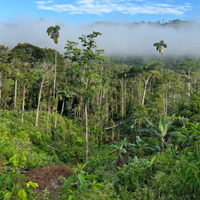- About
- News & Communications
- Programs & Events
- Get in Touch
Back to Top Nav
Back to Top Nav
Back to Top Nav
Back to Top Nav
A public lecture sponsored by the Dartmouth College Dept. of Linguistics.

Guest speakers:
Alexia Fawcett (University of California, Santa Barbara)
Martin Kohlberger (University of Saskatchewan)
There are over 300 languages, representing over 70 genetic units, currently spoken in Amazonia, making it one of the most linguistically diverse regions of the world. Despite the popular misconception of being remote and impenetrable, the region is characterized by dense networks of interaction between communities across ethnic, linguistic, and cultural divides. A high incidence of multilingualism coupled with prevailing ideologies that resist code-mixing have had a profound effect on many languages of the area–encouraging the spread of typologically rare features. In this talk we will discuss the motivations for this diversity and highlight ways in which ritual discourse, such as hunting registers, show the particular dynamics of language contact in the region. We continue by presenting typologically rare structures as well as typologically rare distributions of common features, such as nasality. Finally, we consider methodological approaches that allow us to better understand the features that have made the languages of this region crucial for the advancement of linguistic theory.
Events are free and open to the public unless otherwise noted.